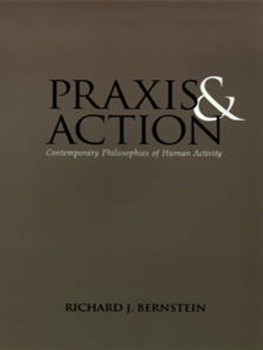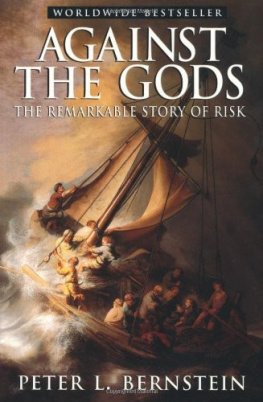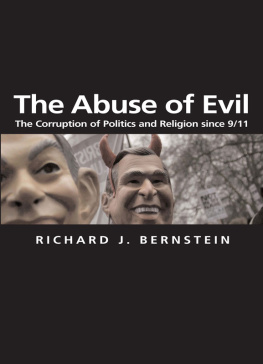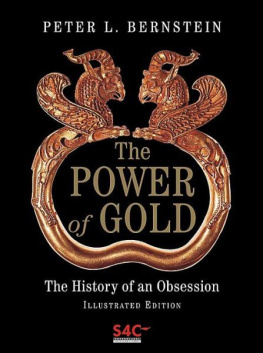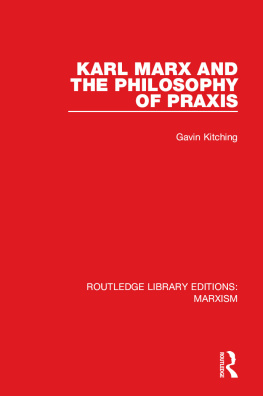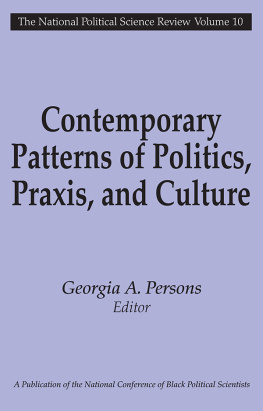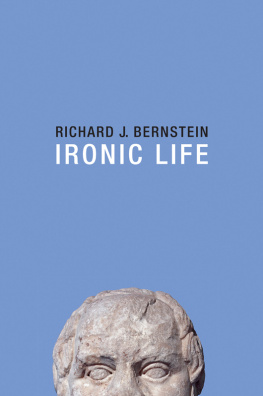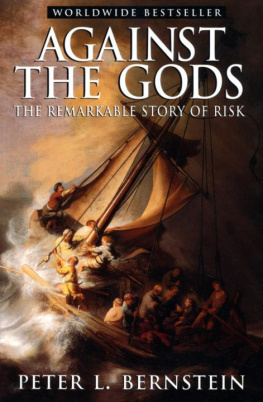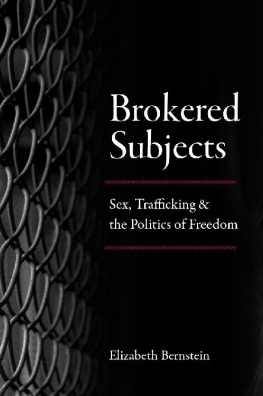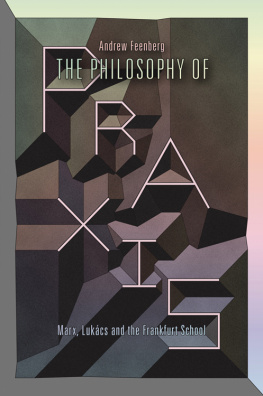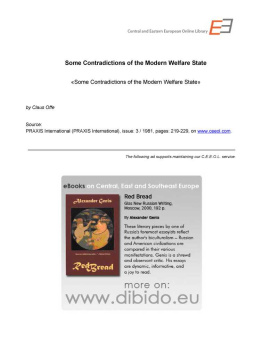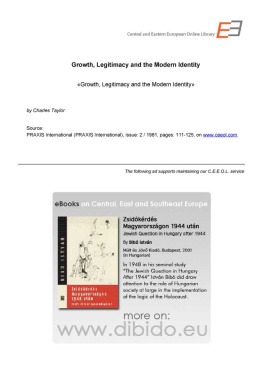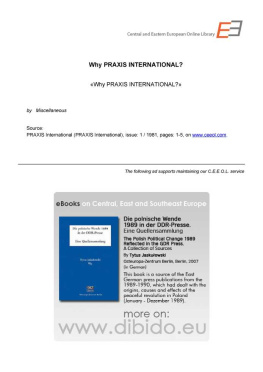Bernstein - Praxis and Action: Contemporary Philosophies of Human Activity
Here you can read online Bernstein - Praxis and Action: Contemporary Philosophies of Human Activity full text of the book (entire story) in english for free. Download pdf and epub, get meaning, cover and reviews about this ebook. publisher: University of Pennsylvania Press, Inc., genre: Religion. Description of the work, (preface) as well as reviews are available. Best literature library LitArk.com created for fans of good reading and offers a wide selection of genres:
Romance novel
Science fiction
Adventure
Detective
Science
History
Home and family
Prose
Art
Politics
Computer
Non-fiction
Religion
Business
Children
Humor
Choose a favorite category and find really read worthwhile books. Enjoy immersion in the world of imagination, feel the emotions of the characters or learn something new for yourself, make an fascinating discovery.
Praxis and Action: Contemporary Philosophies of Human Activity: summary, description and annotation
We offer to read an annotation, description, summary or preface (depends on what the author of the book "Praxis and Action: Contemporary Philosophies of Human Activity" wrote himself). If you haven't found the necessary information about the book — write in the comments, we will try to find it.
Praxis and Action: Contemporary Philosophies of Human Activity — read online for free the complete book (whole text) full work
Below is the text of the book, divided by pages. System saving the place of the last page read, allows you to conveniently read the book "Praxis and Action: Contemporary Philosophies of Human Activity" online for free, without having to search again every time where you left off. Put a bookmark, and you can go to the page where you finished reading at any time.
Font size:
Interval:
Bookmark:

Richard J. Bernstein

AND
ACTION
CONTEMPORARY
PHILOSOPHIES
OF HUMAN
ACTIVITY

University of Pennsylvania Press
Philadelphia
Copyright 1971 by the University of Pennsylvania Press, Inc.
Preface to the New Edition 1999 by the University of Pennsylvania Press
All rights reserved
Printed in the United States of America on acid-free paper
10 9 8 7 6 5 4 3 2 1
Published by
University of Pennsylvania Press
Philadelphia, Pennsylvania 19104-4011
Library of Congress Catalog Card Number: 77-157048
Copyright information for quoted material
Selections from Concluding Unscientific Postscript, by Sren Kierkegaard, trans. by David F. Swenson and Walter Lowrie (copyright 1969 by Princeton University Press; Princeton Paperback, 1968), pp. 7172, 109, 271, 551, reprinted by permission of Princeton University Press and the American Scandinavian Foundation. Selections from Writings of the Young Marx on Philosophy and Society, edited and translated by Loyd D. Easton and Kurt H. Guddat, reprinted by permission of Doubleday & Company, Inc. Selections from G.W. F. Hegel, The Phenomenology of Mind, 2d rev. ed., trans. and with an Introduction by J. B. Baillie, reprinted with the permission of Humanities Press, Inc., New York, and George Allen & Unwin, Ltd., London, 1949. A revised version of sections from Richard J. Bernstein, John Dewey, New York, 1966. Permission granted by Washington Square Press. A revised version of Action, Conduct, and Self-Control, from Perspectives on Peirce, edited by Richard J. Bernstein, New Haven. With the permission of Yale University Press. Selections from Jean-Paul Sartre, Being and Nothingness, trans. by Hazel Barnes, New York, 1956. Permission granted by Philosophical Library.
ISBN (paper) 0-8122-1016-6
Designed by
Martyn J. Hitchcock
FOR CAROL

Platos Phaedrus
PRAXIS AND ACTION was originally published in 1971, but it represents the culmination of my thinking during the previous decade. Although it is difficult to recapture the mood of philosophy in America at that time, it was a period when there was a consolidation of what has come to be called Anglo-American analytic philosophy. Whether influenced by logical empiricism, new developments in the philosophy of science, the technical achievements in formal logic, or the more informal approaches of ordinary language analysis and conceptual analysis practiced in England, the dominant intellectual concerns of many of the most prestigious philosophy departments were radically transformed. A quiet but dramatic revolution was taking place. The 1950s (when I was in graduate school) and the 1960s were an extremely fertile period for the publication of classic books and articles in analytic philosophy.
But along with this important philosophic work, there was the pernicious growth and entrenchment of a powerful ideology, which unfortunately has still not completely disappeared. There was a smug conviction that the analytic styles of doing philosophy were the only legitimate ways of doing philosophy. They were taken to represent standards of clarity, rigor, precision, and argumentative finesse that were presumably lacking in philosophy as it had been traditionally practiced. A loaded question frequently asked was whether one does philosophy or only teaches the history of philosophy. Indeed, there was a denigration of the philosophic value of studying the history of philosophy and engaging with philosophic classics. The model adopted by many bright young philosophers was one that has proved so successful in the natural sciences. One needed to master only the most recent journal articles relevant to the specific problem being addressed. To the extent that there was any interest in the history of philosophy it was oriented to how it anticipated the new sophisticated insight of analytic philosophers. American pragmatism represented by such figures as Peirce, James, Dewey, and Mead was marginalized. At best, it was viewed as a confused and fuzzy-minded approach to problems which could now be handled in a much more rigorous manner. This was also the time of the invention of the continental-analytic split. From the perspective of many analytic philosophers, so-called continental philosophers simply weren't really doing philosophy, so there was no need even to read their works (except to expose the darkness, confusion, and obscurity from which analytic philosophy had liberated us). One should not be naive about the legacy of these ideological prejudices. They still prevail in many philosophy departments.
But also during the 1960s there were some philosophers (I include myself) who resisted this ideology at the same time that we were learning to appreciate the value of the new analytic techniques and insights. (During my graduate education and teaching at Yale I had the good fortune to study and work closely with Carl G. Hempel, Arthur Pap, and Wilfrid Sellars.) But I was reading Carnap, Quine, and Wittgenstein with the same interest and enthusiasm that I was reading Hegel, Kierkegaard, Sartre, and Marx. Many analytic philosophers snickered at the thought that one could find anything of value in Hegel (they still do!). Hegel presumably represented the type of pomposity, obscurity, and muddled thinking from which analytic philosophy had escaped. At a time when it was thought that study of American pragmatic philosophers was better left to American Studies departments, I discovered the richness of this tradition. I wrote my first book on John Dewey.
In writing Praxis and Action I never conceived of myself as building bridges between different philosophic orientations or between continental and Anglo-American philosophy. On the contrary, I was convinced that no single orientation or style of thinking has an exclusive possession of philosophic insight. The philosophic task is to encounter vigorously different ways of philosophizing with hermeneutical sensitivity in order to understand what is being said and why. Such openness is not incompatible with boldly defending one's own distinctive philosophic commitments. On the contrary, this is a way of enriching and strengthening one's own philosophic claims. I believed then (and still believe) in the practice of engaged fallibilistic pluralism, a lesson that I learned from the American pragmatic tradition.
If one is to recapture the mood of the decade during which I was thinking about Praxis and Action one must also appreciate the social and political ferment that was taking place in the United States and throughout the world. I was involved in the early civil rights movement, and even spent a brief period in Mississippi during the Freedom Summer of 1964. The social and political unrest of the time was not unrelated to my intellectual interests. Like Dewey and the young Marx, I became increasing preoccupied with the meaning and the relationship of theory and practice. This was both an intellectual and personal problem. Or rather, as William James and John Dewey have taught us, many of our deepest intellectual questions are rooted in our personal and communal conflicts and struggles. It was this animating concern with praxis that gradually led me to the realization that there was a way reading of Marxism, existentialism, pragmatism, and analytic philosophy as gravitating toward new understandings of
Font size:
Interval:
Bookmark:
Similar books «Praxis and Action: Contemporary Philosophies of Human Activity»
Look at similar books to Praxis and Action: Contemporary Philosophies of Human Activity. We have selected literature similar in name and meaning in the hope of providing readers with more options to find new, interesting, not yet read works.
Discussion, reviews of the book Praxis and Action: Contemporary Philosophies of Human Activity and just readers' own opinions. Leave your comments, write what you think about the work, its meaning or the main characters. Specify what exactly you liked and what you didn't like, and why you think so.

